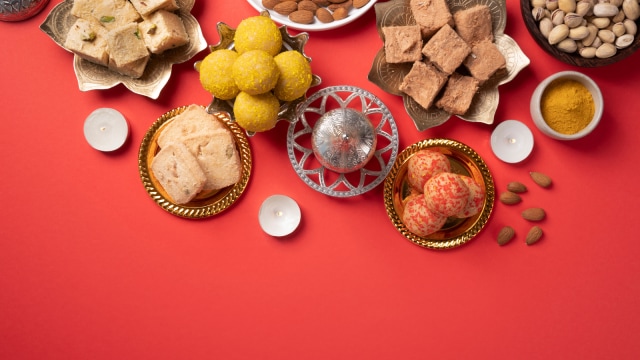2 jalebis are 500 calories, a gulab jamun 150: Why you must count your carbs this Diwali
It is time for healthier alternatives that may keep your diet manageable.
 High sugar intake can cause rapid spikes in blood sugar, posing an increased risk of prediabetes and complicating dental problems for people with diabetes. (Image: Representational/Freepik)
High sugar intake can cause rapid spikes in blood sugar, posing an increased risk of prediabetes and complicating dental problems for people with diabetes. (Image: Representational/Freepik)While you may justify a bit of indulgence on Diwali, you must know a few fast facts. A gulab jamun has close to 150 calories, two jalebis are around 500 calories, two motichoor ladoos make up 360 calories, a samosa and a portion of sohan papdi have 250 to 300 calories each. As for savouries, a fried mathri has 5-7 gms of fat.
“So, imagine how calorie-dense your snacking will be if you have these liberally,” warns Dr Sonu Goel, professor, department of community medicine, PGIMER, Chandigarh. “Just go slow on high-fat, sugar and salt (HFSS) foods,” he adds.
What are common HFSS (high fat, sugar and salt) foods?
All kinds of sweets, fried snacks and pastries. Gulab jamuns, deep-fried and soaked in sugar syrup, are high in both sugar and saturated fats. The deep-fried, crispy mathri has 5-7 grams of mostly saturated fat. It also tends to be high in sodium, as salt and spices are used liberally, with 300-400 mg of sodium per serving.
High sugar intake can cause rapid spikes in blood sugar, posing an increased risk of prediabetes and complicating dental problems for people with diabetes. Excessive consumption of fried food with saturated fats can raise bad cholesterol, heightening the risk of heart disease, brain stroke, fat deposition in the lining of blood vessels and obesity. High salt consumption can lead to water retention and elevated blood pressure.
Where should we be looking for hidden trans fats?
Stay away from food cooked in vegetable oils, which are repeatedly heated beyond their smoke point. They are in commercial pastries, cookies, whipped cream, bakery products and ice creams. Consuming trans fats can increase the risk of heart disease by 21 per cent and raise the chance of death from heart-related issues by 28 per cent. Samosas, kachoris and namkeens may contain trans fats if cooked with hydrogenated oils or vanaspati (vegetable shortening).
What are the effects of consuming too much salt?
Our average daily salt intake of about 11 grams (WHO recommends less than 6 grams per day) doubles during Diwali. Instead of elevating your blood pressure, opt for unsalted nuts or snacks seasoned with herbs and spices. Try fruit chaat or vegetable sticks with yogurt-based dips.
How much sugar and fat are permissible in a day?
The Indian Council of Medical Research (ICMR) and the National Institute of Nutrition (NIN) recommend limiting sugar intake to 20-25 grams per day, about six teaspoons a day for a healthy adult. Fats should make up about 20-35 per cent of your total daily calories. For a 2,000-calorie diet, that’s around 44-78 grams of fat per day.
Are there healthier alternatives?
Opt for dry-fruit based sweets, packed with fibre and healthy fats. A baked samosa has approximately 120-150 calories, as opposed to 250-300 calories of the fried version. Replace refined sugars with natural sweeteners like jaggery, honey, or date syrup, which have a lower glycemic index and are less likely to cause a spike in blood sugar.



- 01
- 02
- 03
- 04
- 05




























